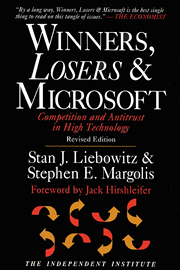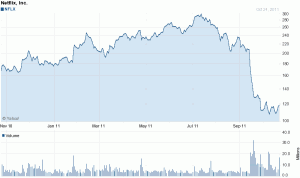Those of you who have been around the economics department the last few years have probably had a brush with Winners, Losers, and Microsoft, where Stan Liebowitz and Steven Margolis examine the antitrust case against Microsoft from the late 1990s.
In today’s New York Times, Paul Krugman makes the case that “Apple’s position in mobile devices now bears a strong resemblance to Microsoft’s former position in operating systems.” That is, Krugman claims that Apple has considerable market power that is substantially augmented by network “externalities.”* As a result, Krugman claims that though “Apple produces high-quality products… they are, by most accounts, little if any better than those of rivals, while selling at premium prices.”
University of Toronto’s Joshua Gans provides an interesting response to Krugman, both in terms of the history of the Microsoft-Apple competition, as well as the extent to which Apple products are a contestable market. Indeed, Gans thinks that the extent of Apple’s market power via network effects is constrained:
Krugman in trying to understand the iPhone relies on network effects (people have apps and are locked in) but apps are so cheap it is hard to imagine this is anything remotely the same as that in the past. Krugman also considers Apple high priced but that is very recent. Before the followers came in, Apple’s iPhone was significant precisely because it was so cheap compared to other proposed smart phones. The same is true of the iPad.
Indeed, that gives us the current narrative. Competitors can use price to compete with Apple (which they couldn’t do with the old Microsoft). Apple, therefore, has to keep quality high and consumers satisfied to survive. That is precisely why the share market has such a hard time with it than with say Amazon that arguably relies more on switching costs to keep its customers. The important point is that that is what we want in the tech world. We want competition on the basis of price and quality and we want it to be tough. In many respects, therefore, we have the free from monopoly cost market that we tried to get in the 1990s and should be happy for it.


